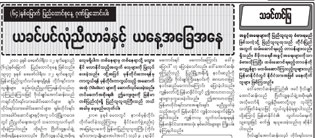An Arakanese politician has responded to the Burmese veteran politician who has criticized plans by the opposition led by Daw Aung San Suu Kyi to hold the second Panglong Conference...
Dhaka: An Arakanese politician has responded to the Burmese veteran politician who has criticized plans by the opposition led by Daw Aung San Suu Kyi to hold the second Panglong Conference.
 Thakhin Tin Mya has criticized the move by the opposition as "inappropriate and unachievable" in his article that was published by the junta's Burmese-language newspaper The Kyemon on 12 February, which was the 64th Union Day in Burma.
Thakhin Tin Mya has criticized the move by the opposition as "inappropriate and unachievable" in his article that was published by the junta's Burmese-language newspaper The Kyemon on 12 February, which was the 64th Union Day in Burma.
"Daw Aung San Suu Kyi's proclamations to hold the second Panglong and to build the unity among all ethnic nationalities in today's situation, dissimilar to the past, are not appropriate and I believe that will not be achievable. Daw Aung San Suu Kyi is also included among those who are never optimistic about anything being done by the Tatmadaw government," said Thakhin Tin Mya in his article "The Previous Panglong Conference and Today's Situation".
U Aye Tha Aung, the secretary of the Arakan League for Democracy and the Committee Representing People's Parliament, said that the second Panglong Conference is necessary with the current political situation in Burma.
"What [Thakhin Tin Mya] has written may be his own opinions, but we have been trying to hold the second Panglong Conference after analyzing the current political circumstances in Burma. It is very necessary to hold the conference and we know that there are also a lot of possibilities to be achieved by the conference. We have also arranged for internet and phone for open participation in the conference, apart from convening the individual representatives of any ethnic background," said U Aye Tha Aung, who is also one of the leaders organizing for the conference.
He added that the current armed clashes in the ethnic areas on the eastern frontiers have necessitated holding the second conference 64 years after the original conference, which brought about the ethnic unity for Burma's independence.
"It has already been 64 years that we have been calling for ethnic unity, but no genuine unity is found in post-independence Burma. There are still armed clashes and tension in the ethnic areas on the eastern frontiers. So it is very necessary to convene the second Panglong to contain the widespread civil wars and tension, and we are planning our best for accomplishing the conference," he said.
In retrospect, the current conflicts in Burma are due to the refusal of successive Burman-dominated governments, including the current regime, to implement the inter-ethnic agreements for equal rights that came out of the original Panglong Conference, without which the independence of Burma from colonial rule would not have been possible.


